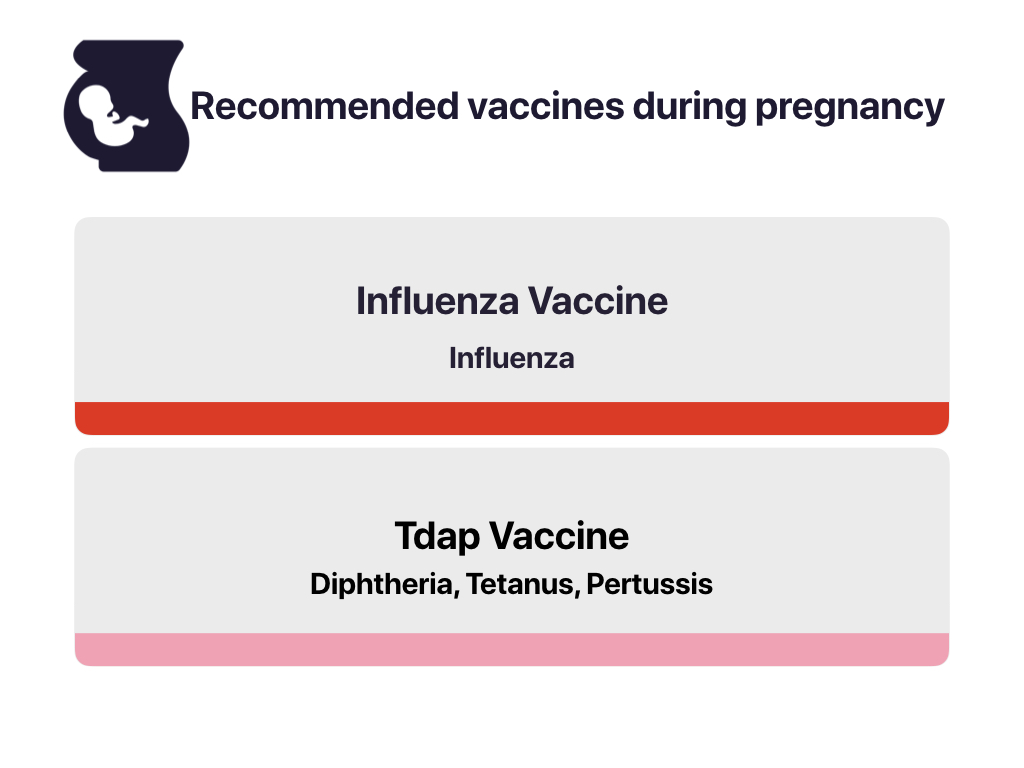Specific Populations and Vaccines
Pregnancy
Pregnancy may lead to altered immune responses that increase risk for infection. Vaccinating in pregnancy prevents disease for the pregnant person and their baby. For example, vaccinating with an inactivated flu is safe and recommended in all pregnancies during flu season. The vaccine lowers the risk of complications from flu during pregnancy and protects infection after the baby is born. See Table 2.4 for routine vaccines during pregnancy.

The other reason to vaccinate during pregnancy is to increase the newborn’s immunity. Because newborn babies are born with rudimentary immune systems, health professionals try to protect the baby in the event of exposure. One method is to vaccinate the pregnant person during pregnancy with, for example, the pertussis vaccine. Another method, called ‘cocooning,’ means vaccinating those around the infant, including the parent and other family members, to ensure they will not infect the newborn. Cocooning can be difficult to do and as a result may not be the preferred strategy.
Table 2.4: Routine Vaccines During Pregnancy
| Vaccine | Vaccine-Preventable Illness | Considerations |
|
Influenza Vaccine
|
Influenza
|
The flu vaccine is safe and recommended for all pregnant people at any stage of pregnancy. It is especially important if the client will be in the later stages of pregnancy during flu season (November to April). The risk of hospitalization from flu complications increases later in pregnancy and is highest in the third trimester. The flu shot also helps protect the baby during the first six months after birth. This is important because babies are at higher risk for flu complications that can result in hospitalizations, and babies under six months of age are too young to be vaccinated.
|
|
Tdap Vaccine
|
Pertussis
|
Immunization for pregnant people is ideally recommended at 27-32 weeks of gestation for each pregnancy, irrespective of previous Tdap immunization history or the interval between pregnancies due to rapid waning maternal antibody.
|
Breastfeeding and Vaccinations
All routine vaccines that are provided in Canada are safe for women who are breastfeeding. Some less common vaccines, like yellow fever and Bacillus Calmette-Guerin (BCG) vaccine for tuberculosis, should not be administered to breastfeeding women. This is because an infection can be passed to the baby through breast milk.
Travel
Talk to your clients about travelling outside of Canada as they may be at risk for vaccine-preventable diseases. Travel health clinics often provide accurate travel advice that takes the destination and the person’s current health status into consideration. It is important to discuss travel plans as far ahead of travel arrangements as possible, preferably six weeks in advance. See Table 2.5 for common global diseases that can be prevented. Review the immunization history with your client. Ensure your client is up to date with the provincial immunization schedule. Discuss any other trip-related health concerns and ways to keep healthy while travelling.
Table 2.5: Common Global Vaccine-Preventable Diseases
| Disease | Vaccine |
|
Cholera and travellers’ diarrhea
|
E.coli
|
|
Hepatitis A
|
HA
|
|
Hepatitis B
|
HB
|
|
Japanese encephalitis
|
JE
|
|
Meningococcal
|
Men-C-ACYW MenB
|
|
Rabies
|
Rabies
|
|
Typhoid
|
Typh
|
|
Yellow fever
|
YF
|
As with routine childhood vaccines, travel vaccines can sometimes come in combined formulations.

